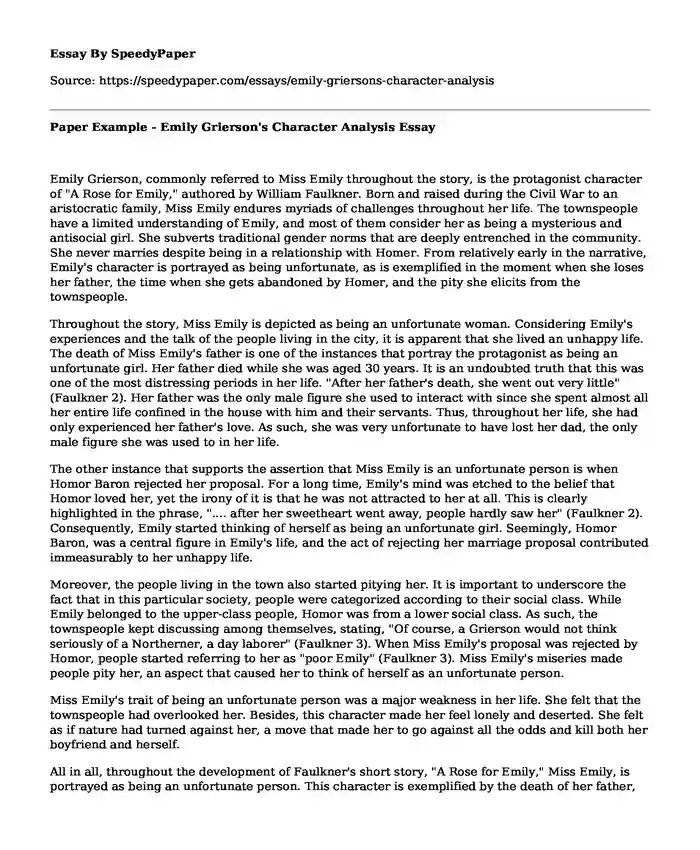
| Type of paper: | Essay |
| Categories: | William Faulkner Character analysis Books |
| Pages: | 3 |
| Wordcount: | 627 words |
Emily Grierson, commonly referred to Miss Emily throughout the story, is the protagonist character of "A Rose for Emily," authored by William Faulkner. Born and raised during the Civil War to an aristocratic family, Miss Emily endures myriads of challenges throughout her life. The townspeople have a limited understanding of Emily, and most of them consider her as being a mysterious and antisocial girl. She subverts traditional gender norms that are deeply entrenched in the community. She never marries despite being in a relationship with Homer. From relatively early in the narrative, Emily's character is portrayed as being unfortunate, as is exemplified in the moment when she loses her father, the time when she gets abandoned by Homer, and the pity she elicits from the townspeople.
Throughout the story, Miss Emily is depicted as being an unfortunate woman. Considering Emily's experiences and the talk of the people living in the city, it is apparent that she lived an unhappy life. The death of Miss Emily's father is one of the instances that portray the protagonist as being an unfortunate girl. Her father died while she was aged 30 years. It is an undoubted truth that this was one of the most distressing periods in her life. "After her father's death, she went out very little" (Faulkner 2). Her father was the only male figure she used to interact with since she spent almost all her entire life confined in the house with him and their servants. Thus, throughout her life, she had only experienced her father's love. As such, she was very unfortunate to have lost her dad, the only male figure she was used to in her life.
The other instance that supports the assertion that Miss Emily is an unfortunate person is when Homor Baron rejected her proposal. For a long time, Emily's mind was etched to the belief that Homor loved her, yet the irony of it is that he was not attracted to her at all. This is clearly highlighted in the phrase, ".... after her sweetheart went away, people hardly saw her" (Faulkner 2). Consequently, Emily started thinking of herself as being an unfortunate girl. Seemingly, Homor Baron, was a central figure in Emily's life, and the act of rejecting her marriage proposal contributed immeasurably to her unhappy life.
Moreover, the people living in the town also started pitying her. It is important to underscore the fact that in this particular society, people were categorized according to their social class. While Emily belonged to the upper-class people, Homor was from a lower social class. As such, the townspeople kept discussing among themselves, stating, "Of course, a Grierson would not think seriously of a Northerner, a day laborer" (Faulkner 3). When Miss Emily's proposal was rejected by Homor, people started referring to her as "poor Emily" (Faulkner 3). Miss Emily's miseries made people pity her, an aspect that caused her to think of herself as an unfortunate person.
Miss Emily's trait of being an unfortunate person was a major weakness in her life. She felt that the townspeople had overlooked her. Besides, this character made her feel lonely and deserted. She felt as if nature had turned against her, a move that made her to go against all the odds and kill both her boyfriend and herself.
All in all, throughout the development of Faulkner's short story, "A Rose for Emily," Miss Emily, is portrayed as being an unfortunate person. This character is exemplified by the death of her father, the rejection by his boyfriend, and the pity she elicits from the public. The trait is a major weakness in her life since she lives an unhappy life. In the end, she kills her boyfriend and then finally commits suicide.
Works Cited
Faulkner, William. A rose for Emily. Merrill, 1970.
Cite this page
Paper Example - Emily Grierson's Character Analysis. (2023, Apr 05). Retrieved from https://speedypaper.com/essays/emily-griersons-character-analysis
Request Removal
If you are the original author of this essay and no longer wish to have it published on the SpeedyPaper website, please click below to request its removal:
- Essay Sample Describing the Two Early Childhood Curriculum
- Free Essay on Allied Health Profession: Radiotherapy Practitioner
- Free Essay Describing Elements of Critical Thinking
- Sports Essay Sample: Legal Duties and Legal Liabilities of Coaches
- Essay Example on The Drivers of Internationalization of Business
- Essay Sample on Sociology of race and racism
- Stems Cells: Combining Technology and Biology. Essay Sample
Popular categories




